
Sage
Multi-Agent System Framework For Complex Tasks
Stars: 613
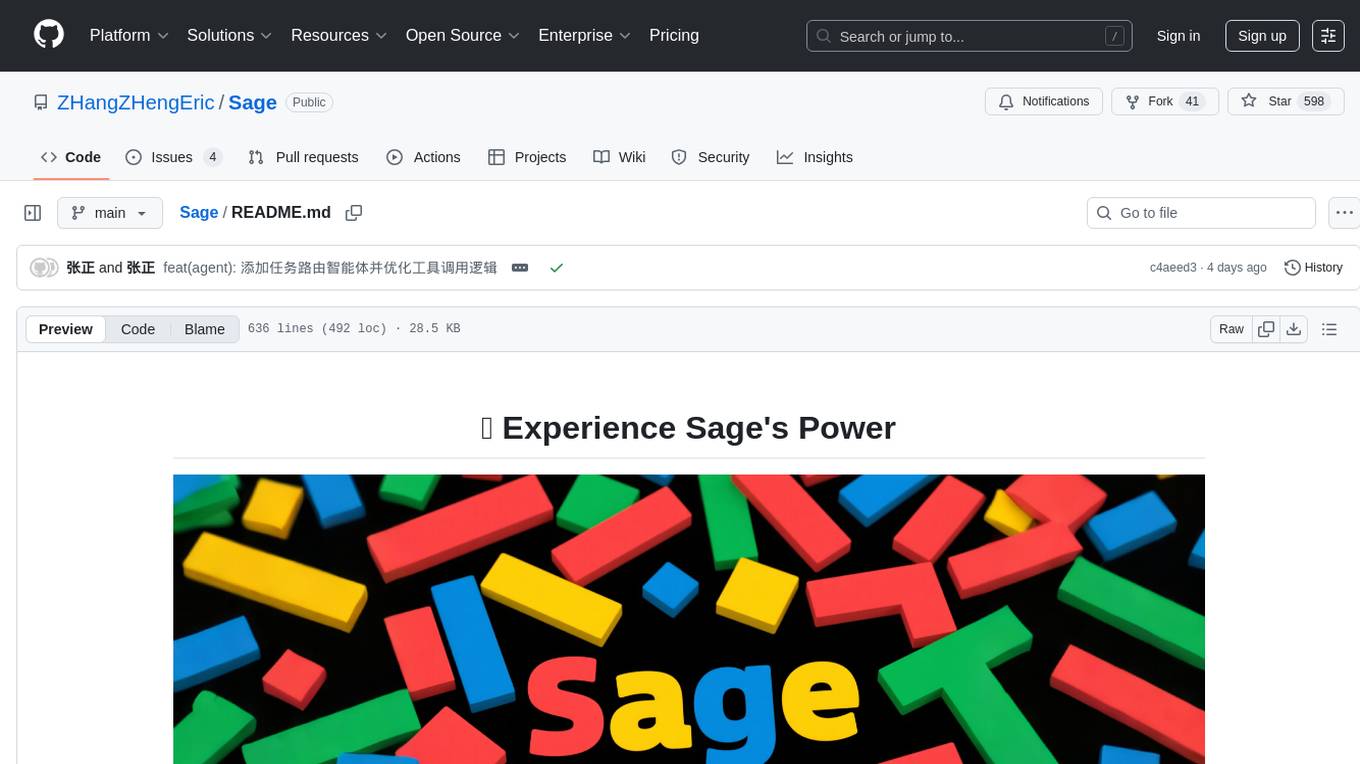
Sage is a production-ready, modular, and intelligent multi-agent orchestration framework for complex problem solving. It intelligently breaks down complex tasks into manageable subtasks through seamless agent collaboration. Sage provides Deep Research Mode for comprehensive analysis and Rapid Execution Mode for quick task completion. It offers features like intelligent task decomposition, agent orchestration, extensible tool system, dual execution modes, interactive web interface, advanced token tracking, rich configuration, developer-friendly APIs, and robust error recovery mechanisms. Sage supports custom workflows, multi-agent collaboration, custom agent development, agent flow orchestration, rule preferences system, message manager for smart token optimization, task manager for comprehensive state management, advanced file system operations, advanced tool system with plugin architecture, token usage & cost monitoring, and rich configuration system. It also includes real-time streaming & monitoring, advanced tool development, error handling & reliability, performance monitoring, MCP server integration, and security features.
README:
🌟 A production-ready, modular, and intelligent multi-agent orchestration framework for complex problem solving
Sage is an advanced multi-agent system that intelligently breaks down complex tasks into manageable subtasks through seamless agent collaboration. Built with enterprise-grade reliability and extensibility in mind, it provides Deep Research Mode for comprehensive analysis and Rapid Execution Mode for quick task completion.
🧠 Intelligent Task Decomposition - Automatically breaks complex problems into manageable subtasks with dependency tracking
🔄 Agent Orchestration - Seamless coordination between specialized agents with robust error handling
🛠️ Extensible Tool System - Plugin-based architecture with MCP server support and auto-discovery
⚡ Dual Execution Modes - Choose between thorough analysis or rapid execution based on your needs
🌐 Interactive Web Interface - Modern React + FastAPI UI with real-time streaming visualization
📊 Advanced Token Tracking - Comprehensive usage statistics and cost monitoring across all agents
⚙️ Rich Configuration - Environment variables, config files, CLI options, and runtime updates
🔧 Developer Friendly - Clean APIs, comprehensive docs, examples, and extensive error handling
🎯 Production Ready - Robust error recovery, logging, retry mechanisms, and performance optimization
| 🏆 Model | 🔧 API Identifier | 🌟 Key Strengths | 🎯 Best Use Cases |
|---|---|---|---|
| 🔥 DeepSeek-V3 | deepseek-chat |
Excellent complex reasoning | Deep analysis, Code generation |
| 🌟 Qwen-3 |
qwen-turbo, qwen-plus
|
Outstanding bilingual capabilities | Multilingual tasks, Text processing |
| 🧠 GPT-4.1 |
gpt-4-turbo, gpt-4o
|
Premium performance for all tasks | Enterprise apps, Complex reasoning |
| ⚡ Claude-3.5 Sonnet | claude-3-5-sonnet-20241022 |
Exceptional reasoning abilities | Creative writing, Logic analysis |
| 🏢 Provider | 🔗 Integration | 🌟 Supported Models |
|---|---|---|
| OpenAI | Direct API | All GPT models |
| OpenRouter | Unified API | 200+ models access |
| Anthropic | Native support | Claude family |
| Google AI | Official API | Gemini series |
| DeepSeek | Native API | All DeepSeek models |
| Alibaba Cloud | Direct integration | Qwen series |
| Mistral AI | Full support | All Mistral models |
💡 Note: While Sage is optimized for the models listed above, it's designed to work with any OpenAI-compatible API endpoint.
graph LR
U[User Input] --> AC[Agent Controller]
AC --> WF
AC --> RM
subgraph WF[Workflow]
A[Analysis Agent] --> B[Planning Agent] --> C[Execution Agent] --> D[Observation Agent] --> E[Summary Agent]
D -- "if not complete" --> B
C -- uses --> X[🛠️ Tool System]
end
E --> R[Result Display]
subgraph RM["Resource & State Management"]
F[TaskManager]
G[MessageManager]
H[Workspace]
endNote: All workflow agents read/write state & context from Resource & State Management (right).
git clone https://github.com/ZHangZHengEric/Sage.git
cd Sage
# Install core dependencies
pip install -r requirements.txt
# Install dependencies for the FastAPI React demo
pip install -r examples/fastapi_react_demo/requirements.txtSage includes several powerful tool systems that require specific dependencies:
-
Core Framework:
openai,pydantic,python-dotenv -
Tool System:
chardet,docstring_parser,requests,httpx -
MCP Support:
mcp,fastmcp -
Web Interface:
fastapi,uvicorn,websockets -
Demo Applications:
streamlit,gradio
All dependencies are automatically managed by the installation script.
Experience Sage through our beautiful web interface with real-time agent visualization. Supports DeepSeek-V3, OpenRouter, and OpenAI models.
Experience Sage through our cutting-edge web application featuring a modern React frontend with FastAPI backend:
Features:
- 🤖 Multi-Agent Collaboration - Visual workflow with decomposition, planning, execution, observation, and summary
- 🧠 Deep Thinking Mode - Expandable thought bubbles showing agent reasoning process
- 🔄 Custom Workflow Management - Create, edit, and manage custom workflows with visual mind-map editor
- ⚡ Response Interruption - Stop AI responses at any time with graceful cancellation handling
- 🚀 FastAPI Backend - High-performance async API server with streaming support
- ⚛️ React Frontend - Modern responsive UI with Ant Design components
- 📡 Real-time Communication - WebSocket + SSE dual support for live updates
- 🎨 Beautiful Interface - Collapsible deep thinking bubbles with modern design
- 🔧 Tool Management - Automatic tool discovery and management
- 💡 Rule Preferences - Personalized AI behavior configuration with custom rules and preferences
- 📱 Responsive Design - Adapts to all screen sizes
- 🔧 TypeScript Support - Full type safety throughout
Quick Start: See FastAPI React Demo README for detailed setup instructions.
🎯 Try the Live Demo: Experience all features immediately at Live Demo →
Demo Features:
- 💬 Interactive Chat Interface - Chat with AI agents using custom workflows
- 🔄 Workflow Configuration - Create and customize workflows with visual editor
- ⚡ Response Interruption - Click stop button to interrupt AI responses at any time
- 💡 Rule Preferences - Configure AI behavior with custom rules and preferences
- 🛠️ System Configuration - Adjust model settings, temperature, and other parameters
- 📊 Real-time Monitoring - Watch token usage and execution progress in real-time
Access the local application at http://localhost:8080. For detailed setup instructions, see the FastAPI React Demo README.
Sage provides a powerful command-line interface for interactive AI agent conversations:
# Basic usage
python examples/sage_cli.py --api_key YOUR_API_KEY --model deepseek/deepseek-chat --base_url https://api.deepseek.com
# With advanced options
python examples/sage_cli.py \
--api_key YOUR_API_KEY \
--model deepseek/deepseek-chat \
--base_url https://api.deepseek.com \
--max_tokens 4096 \
--temperature 0.2 \
--workspace ./workspaceCLI Features:
- 🤖 Interactive Conversations: Natural language chat with AI agents
- 🔧 Tool Integration: Built-in MCP tools for file operations, web search, etc.
- 🧠 Deep Thinking Mode: Optional detailed reasoning process
- 👥 Multi-Agent Support: Complex task handling with agent collaboration
- 🎨 Beautiful Interface: Colored message frames with different visual effects
- ⚡ Streaming Output: Real-time AI responses for smooth interaction
📖 For detailed CLI usage, configuration, and examples, see Examples README
- Task Analysis Agent: Enhanced deep understanding with context awareness and unified system prompt management
- Task Decompose Agent: Intelligent task breakdown with dependency analysis, parallel execution planning, and TaskManager integration
- Planning Agent: Strategic decomposition with dependency management, optimal tool selection, and MessageManager optimization
- Executor Agent: Intelligent tool execution with error recovery, retry mechanisms, parallel processing, and result management
- Observation Agent: Advanced progress monitoring with completion detection, quality assessment, and TaskManager state tracking
- Summary Agent: Comprehensive result synthesis with structured output, actionable insights, and execution history analysis
- Task Router Agent: 🆕 Intelligent task routing system that automatically directs tasks to the most suitable agents based on task type and complexity
- Task Rewrite Agent: Intelligent task reformulation and optimization for better execution
- Task Stage Summary Agent: Intermediate progress summarization and milestone tracking
- Query Suggest Agent: Smart query enhancement and suggestion generation
- Workflow Select Agent: Intelligent workflow selection and optimization
- Simple Agent: Lightweight agent for basic tasks and rapid prototyping with optimized tool handling logic
- Simple React Agent: Reactive agent with real-time response capabilities
- Common Agent: General-purpose agent for standard operations
- Message Manager: Smart message filtering and compression system for token optimization across all agents
- Task Manager: Structured task lifecycle management with state persistence and dependency tracking
- Visual Workflow Editor: Interactive drag-and-drop interface for creating custom workflows with mind-map visualization
- Predefined Templates: Ready-to-use workflows for research reports, product development, content creation, and more
- Smart Step Management: Hierarchical workflow structure with main steps and sub-steps for complex task organization
- Real-time Preview: Live visualization of workflow structure with automatic layout and connection rendering
- Workflow Stability: Deterministic execution paths with consistent results for production environments
- Template Sharing: Export/import workflow configurations and share across teams and projects
- Zoom & Pan Support: Navigate large workflows with mouse wheel zoom and drag-to-pan functionality
- Auto-fit Display: Intelligent viewport adjustment to show all workflow nodes at optimal scale
- AgentBase Framework: Abstract base class for creating custom agents with standardized interfaces
- Agent-to-Tool Conversion: Automatic conversion of agents to tool format for seamless integration
- Streaming Support: Built-in streaming capabilities for real-time agent responses
- Context Management: Unified session context and system message handling
- Plugin Architecture: Extensible plugin system for custom agent implementations
- Agent Registration: Dynamic agent discovery and registration from directories
- Sequential Execution: Define custom agent execution sequences with AgentFlow
- Session Management: Automatic session context initialization and cleanup
- Workflow Integration: Support for available_workflows parameter in agent flows
- Error Recovery: Robust error handling with session state preservation
- Interruption Support: Graceful handling of workflow interruptions
- Memory Management: Automatic cleanup to prevent memory leaks
- Personalized AI Behavior: Configure AI assistant behavior with custom rules and preferences
- Code Style Preferences: Define coding standards, naming conventions, and style guidelines
- Response Language Settings: Control language preferences and localization settings
- Detail Level Control: Adjust verbosity and explanation depth according to your needs
- Template Library: Quick-start templates for common preference patterns
- Real-time Management: Add, edit, enable/disable rules through intuitive web interface
- Context Integration: Rules automatically apply across all agent interactions
- Intelligent Filtering: Agent-specific message filtering strategies for optimal context management
- Automatic Compression: Smart message compression reducing token usage by 30-70%
- Session Isolation: Independent message managers per session preventing cross-contamination
- Agent-Specific Strategies: Customized filtering for each agent type (TaskDecompose, Planning, Executor, etc.)
- Real-time Statistics: Live compression metrics and optimization tracking
- State Persistence: Automatic saving and restoration of message manager state
- Task Lifecycle Management: Complete task creation, execution, and completion tracking
- Dependency Tracking: Smart dependency resolution and execution ordering
- State Persistence: Automatic task state saving to workspace files
- Progress Monitoring: Real-time task progress and completion status
- Session Integration: Seamless integration with AgentController for workflow management
- Structured Data: Rich task objects with metadata, timing, and result storage
- Smart Content Search: Multi-keyword search with context extraction and relevance scoring
- Encoding Detection: Automatic character encoding detection for international files
- Security Validation: Path traversal protection and dangerous file detection
- Metadata Extraction: Comprehensive file information including size, permissions, and timestamps
- Range Reading: Efficient partial file reading with line-based navigation
- Error Recovery: Robust error handling with detailed diagnostic information
- Plugin Architecture: Hot-reloadable tool development with automatic registration and versioning
- MCP Server Support: Seamless integration with Model Context Protocol servers and remote APIs, with added API key authentication for SSE MCP server connections
- Built-in MCP Servers: Pre-built servers for file operations, parsing, command execution, and web search
- Auto-Discovery: Intelligent tool detection from directories, modules, and remote endpoints
- Type Safety: Comprehensive parameter validation with schema enforcement and runtime checks
- Error Handling: Robust error recovery, timeout management, retry strategies, and detailed logging
- Performance Monitoring: Tool execution time tracking, bottleneck detection, and optimization suggestions
- Security Features: Path validation, dangerous file detection, and protected directory access control
- Real-time Tracking: Monitor token consumption across all agents and operations with MessageManager optimization
- Detailed Analytics: Input, output, cached, and reasoning token breakdown with compression statistics
- Cost Estimation: Calculate costs based on model pricing and usage patterns with savings tracking
- Performance Metrics: Track execution time, success rates, efficiency, and token reduction rates
- Smart Optimization: Automatic message filtering and compression reducing token usage by 30-70%
- Export Capabilities: CSV, JSON export for further analysis including optimization metrics
-
Web Interface: Configure rules through the modern React interface at
/rules - Runtime Application: Rules automatically apply to all agent interactions
- Template System: Quick-start with predefined rule templates
- Export/Import: Share rule configurations across environments
-
Environment Variables:
SAGE_DEBUG,OPENAI_API_KEY,SAGE_MAX_LOOP_COUNT, etc. - Config Files: YAML/JSON configuration with validation and hot-reload
- Runtime Updates: Dynamic configuration changes without restart
- CLI Options: Comprehensive command-line interface with help system
- Profile Management: Save and load configuration profiles
- Enable comprehensive task analysis and detailed decomposition
- Generate detailed summary with insights
- Full multi-agent pipeline execution
- Enable task analysis
- Generate summary
- Skip detailed decomposition phase
- Skip analysis phase
- Direct execution
- Minimize processing time
Watch your agents work in real-time with detailed progress tracking and performance metrics, supporting real-time statistics and monitoring capabilities.
Create sophisticated custom tools with full framework integration, including caching, validation, error handling, and advanced features.
Sage includes comprehensive error handling and recovery mechanisms with automatic retry, exponential backoff, and exception management.
Monitor and optimize your agent performance with detailed tracking, statistics analysis, and bottleneck identification.
Seamlessly integrate with Model Context Protocol servers, supporting automatic tool discovery and remote API calls.
Sage includes several production-ready MCP servers:
- Smart File Operations: Advanced file reading with line range support and encoding detection
- Security Controls: Path validation, dangerous file detection, and protected directory access
- Cloud Integration: Optional cloud upload capabilities
- Batch Processing: Multi-file operations with error handling
- Multi-Format Support: 20+ file formats including PDF, Word, Excel, PowerPoint, HTML, and more
- Intelligent Extraction: Smart text extraction with metadata preservation
- Web Content: URL parsing and HTML content extraction
- Batch Processing: Multiple file parsing with performance optimization
- Secure Execution: Safe command execution with timeout management
- Cross-Platform: Windows, macOS, and Linux support
- Error Handling: Comprehensive error capture and reporting
- Security Features: Command validation and execution sandboxing
- Serper Integration: High-quality web search results
- Content Extraction: Automatic content parsing from search results
- Rate Limiting: Built-in request throttling
- Result Formatting: Clean, structured search output
Sage supports three MCP connection types:
{
"mcpServers": {
"file_system": {
"command": "python",
"args": ["./mcp_servers/file_system/file_system.py"],
"connection_type": "stdio"
}
}
}{
"mcpServers": {
"file_parser": {
"sse_url": "http://127.0.0.1:34001/sse",
"api_key": "your-api-key"
}
}
}{
"mcpServers": {
"web_service": {
"streamable_http_url": "http://api.example.com/mcp",
"api_key": "your-api-key"
}
}
}| Connection Type | Use Case | Advantages | Best For |
|---|---|---|---|
| STDIO | Local processes | Low latency, secure | Development, local tools |
| SSE | Remote servers | Real-time streaming | Cloud services, live data |
| Streamable HTTP | Web APIs | HTTP compatibility | REST APIs, microservices |
- API Key Authentication: Secure access control for remote MCP servers
- Connection Validation: Automatic health checks and connection monitoring
- Error Recovery: Robust reconnection and failover mechanisms
- Rate Limiting: Built-in request throttling and quota management
from sagents.agent.agent_base import AgentBase
from sagents.context.session_context import SessionContext
from sagents.context.messages.message import MessageChunk, MessageRole, MessageType
class CustomResearchAgent(AgentBase):
"""Custom agent for specialized research tasks"""
def __init__(self, model, model_config):
super().__init__(model, model_config, system_prefix="Research Agent")
self.agent_description = "Specialized agent for in-depth research and analysis"
def run_stream(self, session_context: SessionContext, tool_manager=None, session_id=None):
"""Implement custom agent logic"""
# Access conversation history
messages = session_context.message_manager.get_messages_for_llm()
# Custom research logic here
research_prompt = "Conduct thorough research on the given topic..."
# Stream responses
for chunk in self._call_llm_streaming(
messages + [{"role": "user", "content": research_prompt}],
session_id=session_id,
step_name="research_analysis"
):
yield [chunk]from sagents.agent_flow import AgentFlow
from sagents.agent.task_analysis_agent import TaskAnalysisAgent
from sagents.agent.task_planning_agent import PlanningAgent
from sagents.agent.task_executor_agent import ExecutorAgent
# Define custom agent sequence
custom_agents = [
TaskAnalysisAgent(model, model_config),
CustomResearchAgent(model, model_config),
PlanningAgent(model, model_config),
ExecutorAgent(model, model_config)
]
# Create agent flow
agent_flow = AgentFlow(custom_agents, workspace="./workspace")
# Execute with streaming
for message_chunks in agent_flow.run_stream(
input_messages=messages,
tool_manager=tool_manager,
session_id="custom-session",
system_context={
"project_type": "research",
"domain": "AI/ML"
}
):
# Process streaming results
for chunk in message_chunks:
print(f"{chunk.role}: {chunk.content}")# Convert agent to tool for use in other workflows
research_tool = CustomResearchAgent(model, model_config).to_tool()
# Register with tool manager
tool_manager.register_tool(research_tool)
# Now available as a tool in other agent workflows
result = tool_manager.run_tool(
"CustomResearchAgent",
messages=messages,
session_id=session_id
)- Quick Start Guide - Get up and running in 5 minutes
- Architecture Overview - Detailed system design
- API Reference - Complete API documentation
- Tool Development - Create custom tools
- Configuration Guide - Advanced configuration options
- Examples - Real-world usage examples
Sage is production-ready with enterprise features, supporting configuration management, logging, and monitoring capabilities.
Create, edit, and visualize custom workflows with our interactive mind-map editor, supporting automatic workflow selection and intelligent execution.
Visual Editor Features:
- 🎨 Mind-map visualization with hierarchical node layout
- 🖱️ Interactive editing - click to edit nodes directly
- 🔍 Zoom & Pan - navigate large workflows with mouse controls
- 📐 Auto-fit display - intelligent viewport adjustment
- 💾 Template system - save and reuse workflow configurations
Stop AI responses at any time with graceful cancellation and resource cleanup, with web interface support for stopping responses via button click.
Interruption Features:
- 🛑 Immediate stopping - responses halt within 1-2 seconds
- 🧹 Resource cleanup - proper memory and connection management
- 💾 State preservation - partial results are saved and accessible
- 🔄 Resumable execution - continue from interruption point if needed
- Task Router Agent: 🆕 Intelligent task routing system that automatically directs tasks to the most suitable agents based on task type and complexity
- Unified Tool Interface: Standardized tool calling interface using session_context instead of messages parameter for better consistency
- Enhanced Workflow Display: Improved workflow step visualization with detailed step descriptions and progress indicators
- Optimized Simple Agent: Enhanced tool handling logic that returns directly when tool count is minimal for better performance
- Simplified Configuration: Updated .gitignore with streamlined pycache configuration for cleaner project structure
- Advanced File Search: Enhanced file content search with multi-keyword support, context extraction, and relevance scoring
- Built-in MCP Servers: Four production-ready MCP servers for file operations, parsing, command execution, and web search
- Triple MCP Connection Support: STDIO, SSE, and Streamable HTTP connection types with API key authentication
- Extended Agent Ecosystem: 14 specialized agents including Task Router, Task Rewrite, Query Suggest, Workflow Select, and more
- Custom Agent Development: AgentBase framework for creating specialized agents with standardized interfaces
- Agent Flow Orchestration: Sequential agent execution with AgentFlow for custom workflow design
- Agent-to-Tool Conversion: Automatic conversion of agents to tools for seamless integration
- Interface Standardization: Unified tool calling patterns across all agents for better maintainability
- Performance Optimization: Improved file reading with range-based operations and metadata caching
- Error Recovery: Enhanced error handling with detailed diagnostic information and recovery strategies
- Type Safety: Comprehensive parameter validation with schema enforcement
- Memory Management: Optimized memory usage for large file operations
- Streaming Support: Real-time streaming capabilities for long-running operations
- Workflow Visualization: Enhanced step display with descriptive information and better user experience
- Tool Interface Consistency: Standardized tool calling interface across all agent types
- Workflow Step Display: Improved step description rendering and progress tracking
- Simple Agent Optimization: Fixed tool handling logic for scenarios with minimal tool requirements
- Configuration Management: Streamlined project configuration and dependency management
- Framework Stability: Enhanced overall system reliability and error recovery
This project is licensed under the MIT License - see the LICENSE file for details.
- OpenAI for the powerful language models
- DeepSeek for the exceptional V3 model
- Alibaba Cloud for the Qwen series
- The open-source community for inspiration and tools
- All contributors who help make Sage better
For Tasks:
Click tags to check more tools for each tasksFor Jobs:
Alternative AI tools for Sage
Similar Open Source Tools

Sage
Sage is a production-ready, modular, and intelligent multi-agent orchestration framework for complex problem solving. It intelligently breaks down complex tasks into manageable subtasks through seamless agent collaboration. Sage provides Deep Research Mode for comprehensive analysis and Rapid Execution Mode for quick task completion. It offers features like intelligent task decomposition, agent orchestration, extensible tool system, dual execution modes, interactive web interface, advanced token tracking, rich configuration, developer-friendly APIs, and robust error recovery mechanisms. Sage supports custom workflows, multi-agent collaboration, custom agent development, agent flow orchestration, rule preferences system, message manager for smart token optimization, task manager for comprehensive state management, advanced file system operations, advanced tool system with plugin architecture, token usage & cost monitoring, and rich configuration system. It also includes real-time streaming & monitoring, advanced tool development, error handling & reliability, performance monitoring, MCP server integration, and security features.
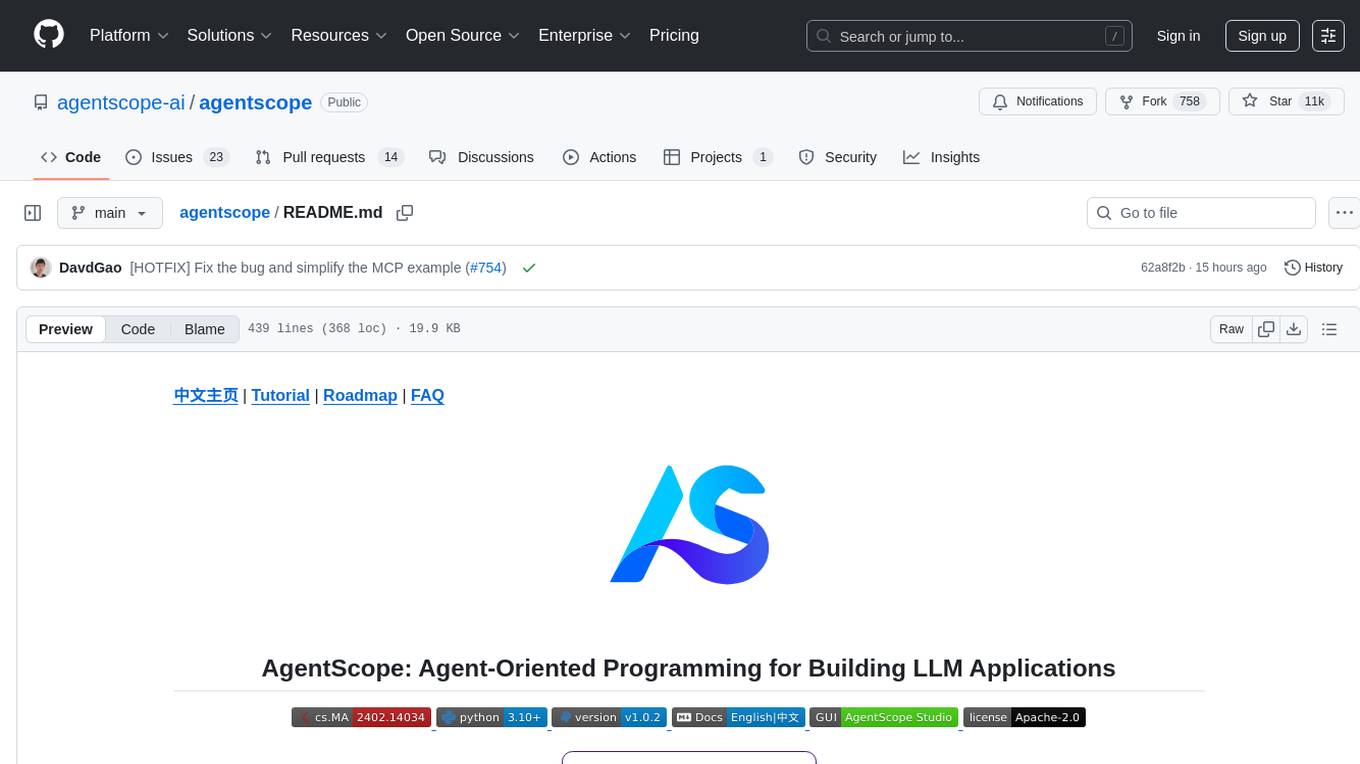
agentscope
AgentScope is an agent-oriented programming tool for building LLM (Large Language Model) applications. It provides transparent development, realtime steering, agentic tools management, model agnostic programming, LEGO-style agent building, multi-agent support, and high customizability. The tool supports async invocation, reasoning models, streaming returns, async/sync tool functions, user interruption, group-wise tools management, streamable transport, stateful/stateless mode MCP client, distributed and parallel evaluation, multi-agent conversation management, and fine-grained MCP control. AgentScope Studio enables tracing and visualization of agent applications. The tool is highly customizable and encourages customization at various levels.
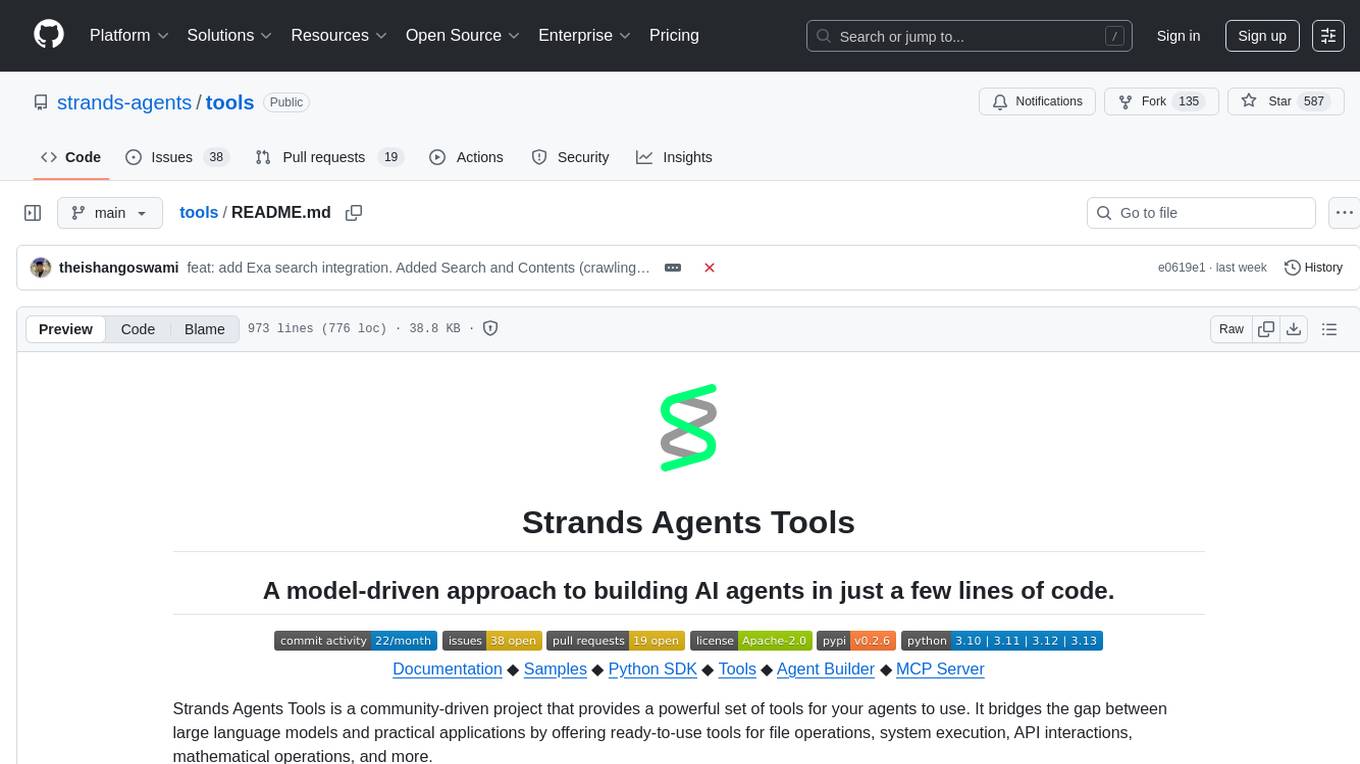
tools
Strands Agents Tools is a community-driven project that provides a powerful set of tools for your agents to use. It bridges the gap between large language models and practical applications by offering ready-to-use tools for file operations, system execution, API interactions, mathematical operations, and more. The tools cover a wide range of functionalities including file operations, shell integration, memory storage, web infrastructure, HTTP client, Slack client, Python execution, mathematical tools, AWS integration, image and video processing, audio output, environment management, task scheduling, advanced reasoning, swarm intelligence, dynamic MCP client, parallel tool execution, browser automation, diagram creation, RSS feed management, and computer automation.

koog
Koog is a Kotlin-based framework for building and running AI agents entirely in idiomatic Kotlin. It allows users to create agents that interact with tools, handle complex workflows, and communicate with users. Key features include pure Kotlin implementation, MCP integration, embedding capabilities, custom tool creation, ready-to-use components, intelligent history compression, powerful streaming API, persistent agent memory, comprehensive tracing, flexible graph workflows, modular feature system, scalable architecture, and multiplatform support.
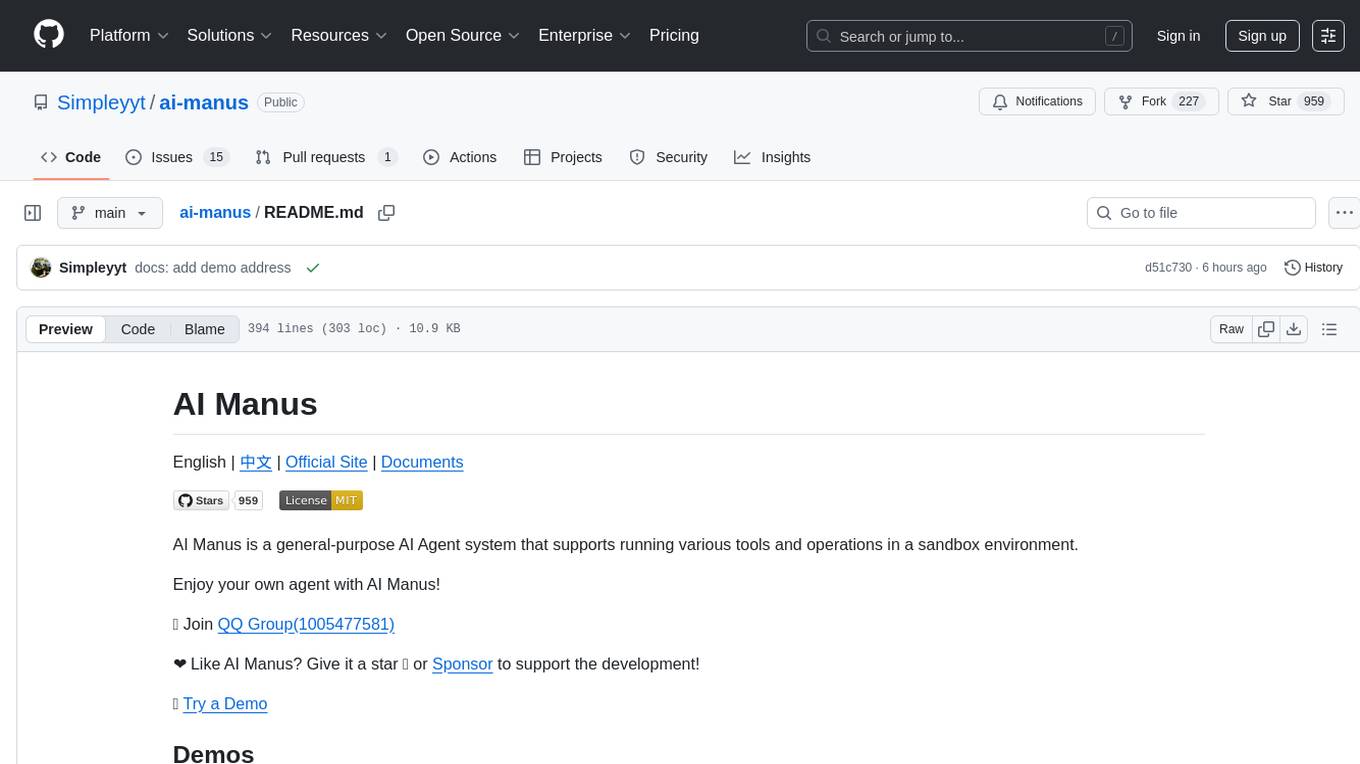
ai-manus
AI Manus is a general-purpose AI Agent system that supports running various tools and operations in a sandbox environment. It offers deployment with minimal dependencies, supports multiple tools like Terminal, Browser, File, Web Search, and messaging tools, allocates separate sandboxes for tasks, manages session history, supports stopping and interrupting conversations, file upload and download, and is multilingual. The system also provides user login and authentication. The project primarily relies on Docker for development and deployment, with model capability requirements and recommended Deepseek and GPT models.
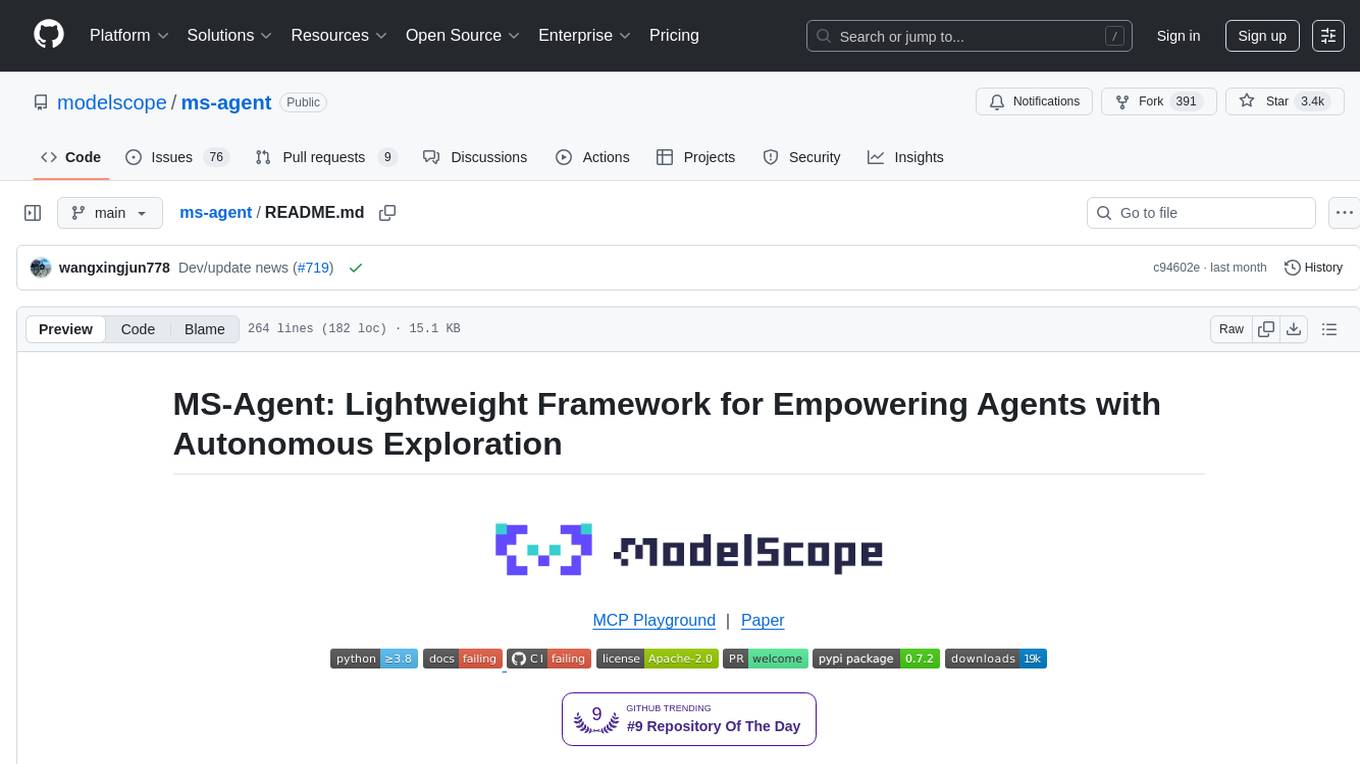
ms-agent
MS-Agent is a lightweight framework designed to empower agents with autonomous exploration capabilities. It provides a flexible and extensible architecture for creating agents capable of tasks like code generation, data analysis, and tool calling with MCP support. The framework supports multi-agent interactions, deep research, code generation, and is lightweight and extensible for various applications.
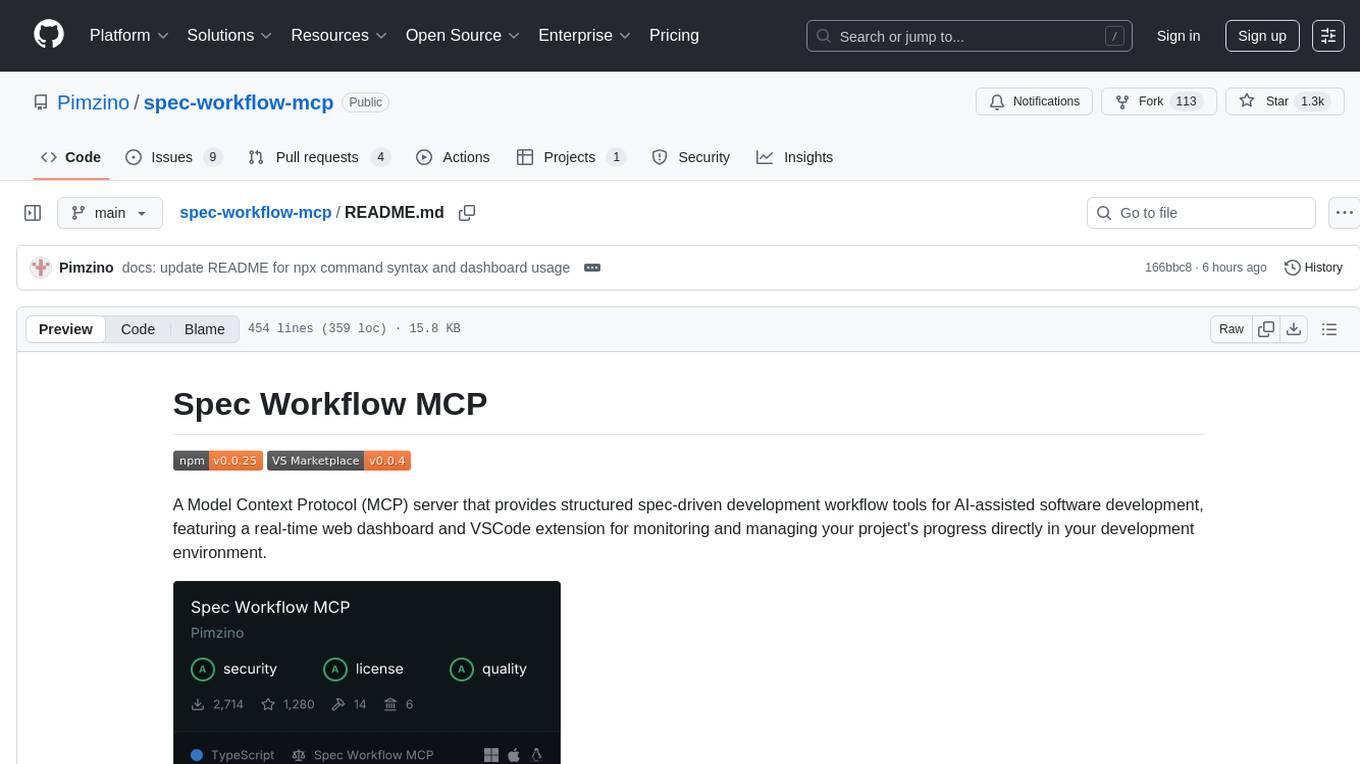
spec-workflow-mcp
Spec Workflow MCP is a Model Context Protocol (MCP) server that offers structured spec-driven development workflow tools for AI-assisted software development. It includes a real-time web dashboard and a VSCode extension for monitoring and managing project progress directly in the development environment. The tool supports sequential spec creation, real-time monitoring of specs and tasks, document management, archive system, task progress tracking, approval workflow, bug reporting, template system, and works on Windows, macOS, and Linux.
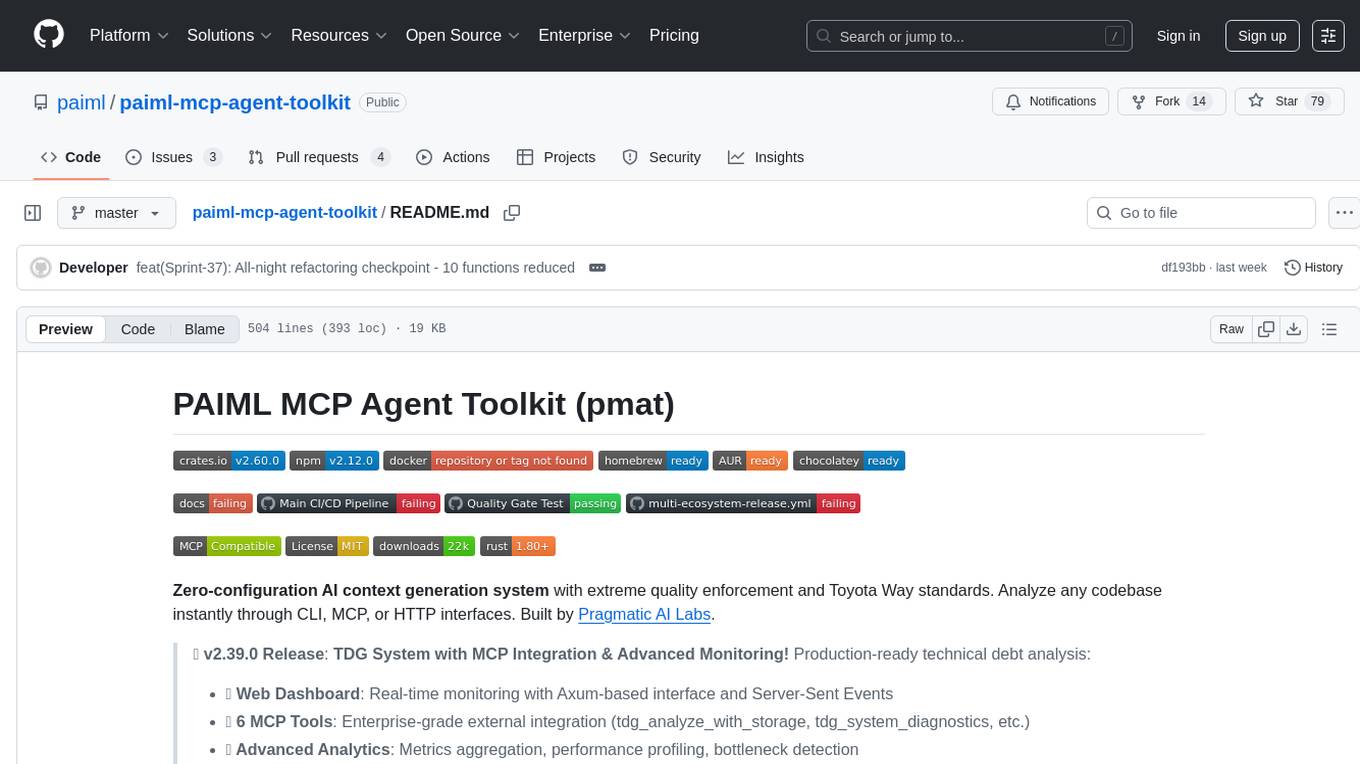
paiml-mcp-agent-toolkit
PAIML MCP Agent Toolkit (PMAT) is a zero-configuration AI context generation system with extreme quality enforcement and Toyota Way standards. It allows users to analyze any codebase instantly through CLI, MCP, or HTTP interfaces. The toolkit provides features such as technical debt analysis, advanced monitoring, metrics aggregation, performance profiling, bottleneck detection, alert system, multi-format export, storage flexibility, and more. It also offers AI-powered intelligence for smart recommendations, polyglot analysis, repository showcase, and integration points. PMAT enforces quality standards like complexity ≤20, zero SATD comments, test coverage >80%, no lint warnings, and synchronized documentation with commits. The toolkit follows Toyota Way development principles for iterative improvement, direct AST traversal, automated quality gates, and zero SATD policy.
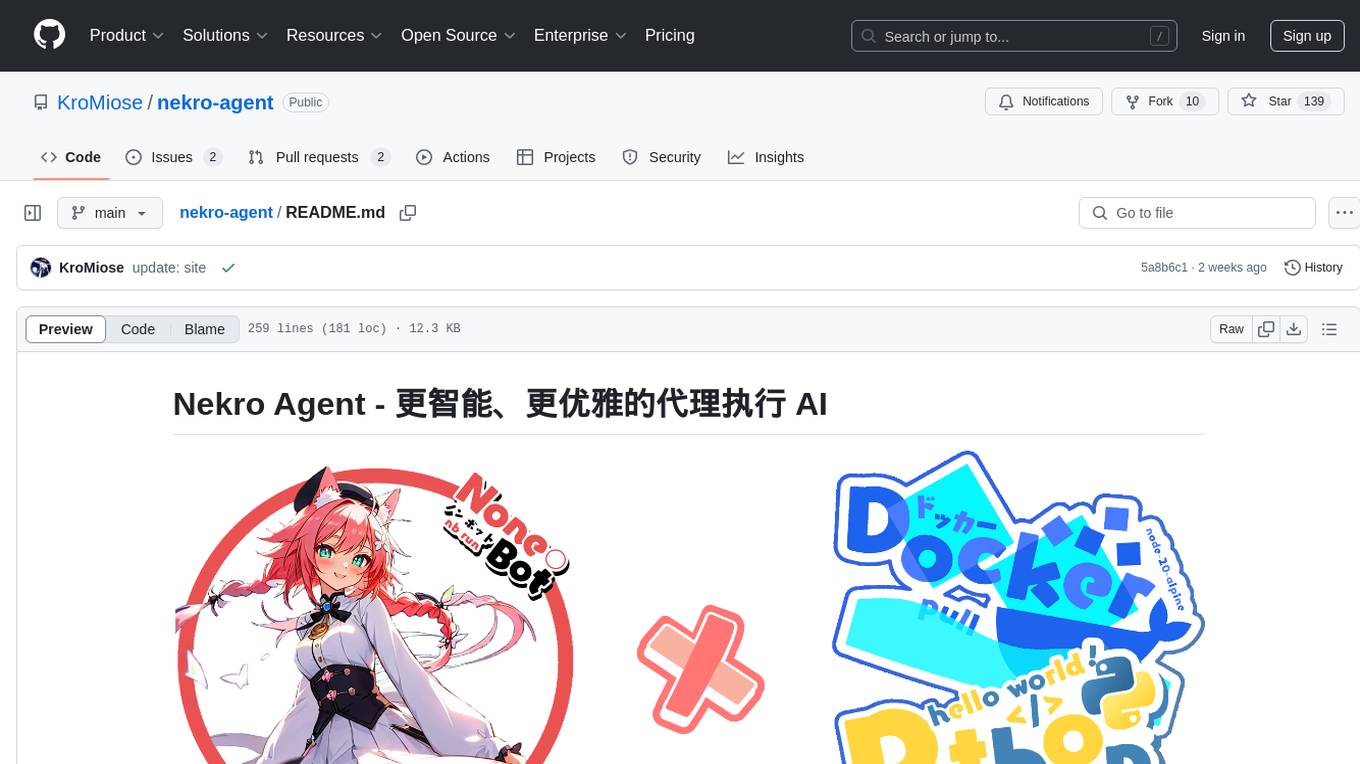
nekro-agent
Nekro Agent is an AI chat plugin and proxy execution bot that is highly scalable, offers high freedom, and has minimal deployment requirements. It features context-aware chat for group/private chats, custom character settings, sandboxed execution environment, interactive image resource handling, customizable extension development interface, easy deployment with docker-compose, integration with Stable Diffusion for AI drawing capabilities, support for various file types interaction, hot configuration updates and command control, native multimodal understanding, visual application management control panel, CoT (Chain of Thought) support, self-triggered timers and holiday greetings, event notification understanding, and more. It allows for third-party extensions and AI-generated extensions, and includes features like automatic context trigger based on LLM, and a variety of basic commands for bot administrators.
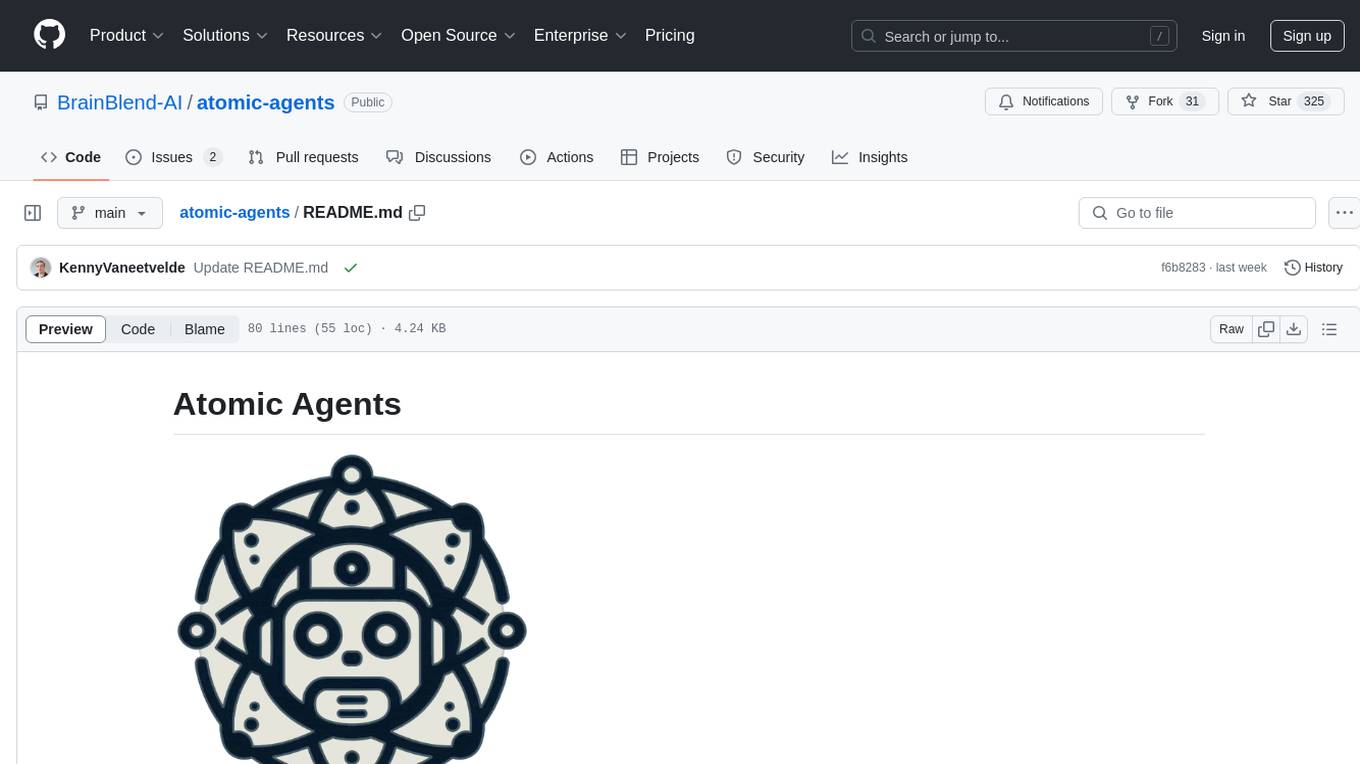
atomic-agents
The Atomic Agents framework is a modular and extensible tool designed for creating powerful applications. It leverages Pydantic for data validation and serialization. The framework follows the principles of Atomic Design, providing small and single-purpose components that can be combined. It integrates with Instructor for AI agent architecture and supports various APIs like Cohere, Anthropic, and Gemini. The tool includes documentation, examples, and testing features to ensure smooth development and usage.
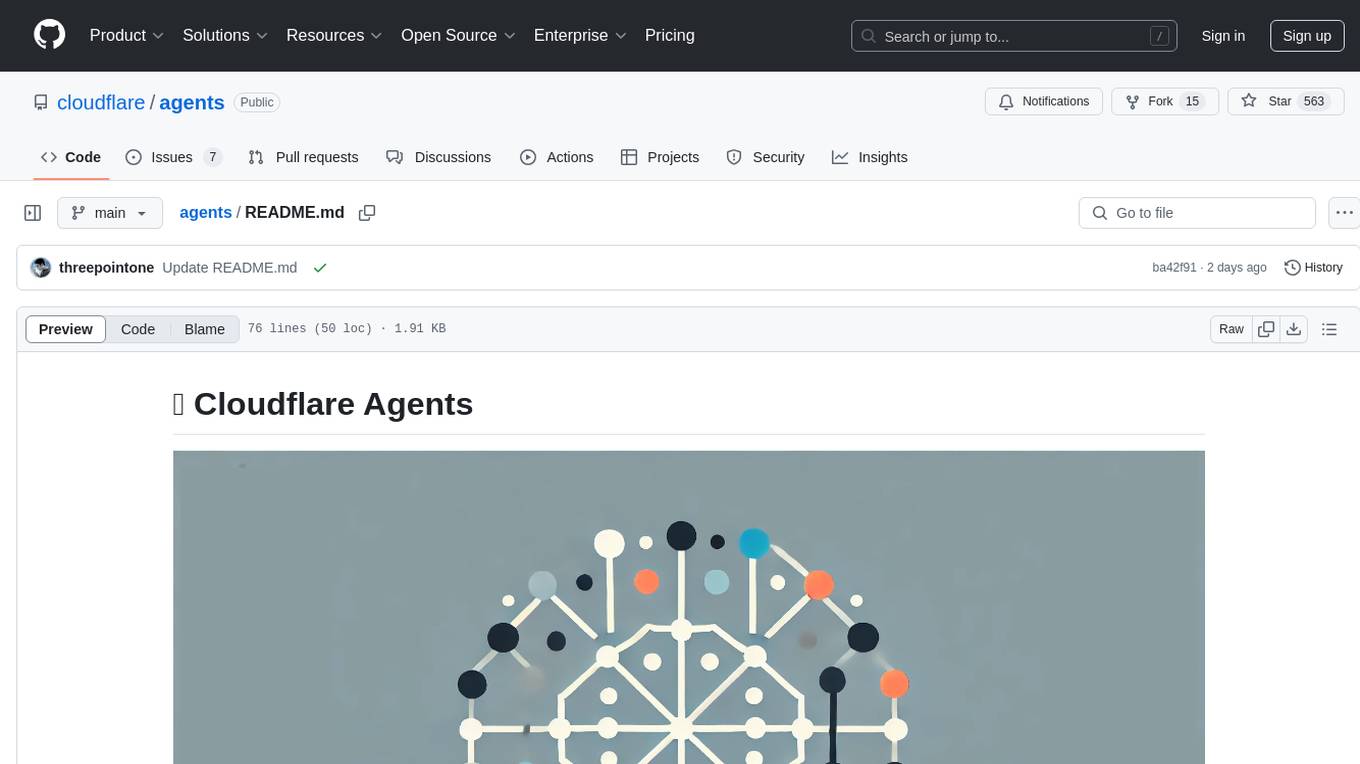
agents
Cloudflare Agents is a framework for building intelligent, stateful agents that persist, think, and evolve at the edge of the network. It allows for maintaining persistent state and memory, real-time communication, processing and learning from interactions, autonomous operation at global scale, and hibernating when idle. The project is actively evolving with focus on core agent framework, WebSocket communication, HTTP endpoints, React integration, and basic AI chat capabilities. Future developments include advanced memory systems, WebRTC for audio/video, email integration, evaluation framework, enhanced observability, and self-hosting guide.
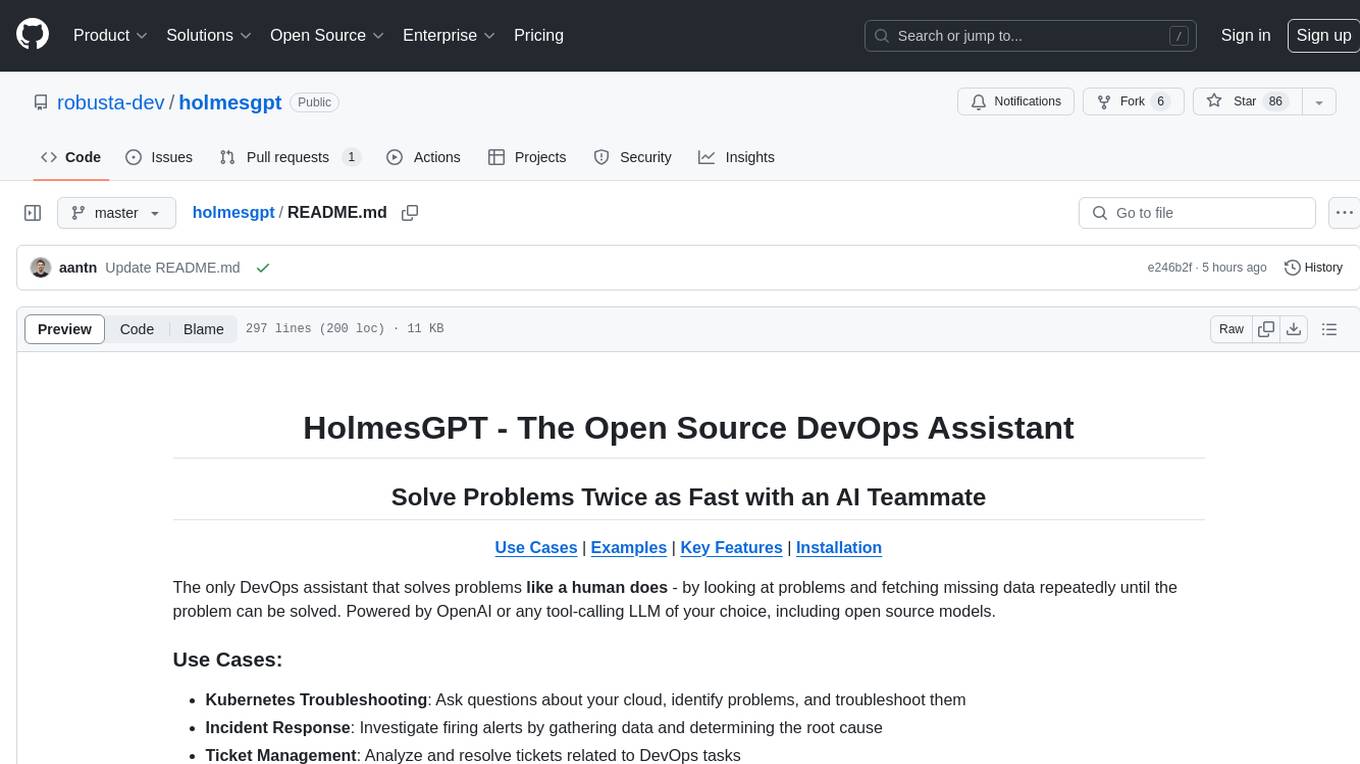
holmesgpt
HolmesGPT is an open-source DevOps assistant powered by OpenAI or any tool-calling LLM of your choice. It helps in troubleshooting Kubernetes, incident response, ticket management, automated investigation, and runbook automation in plain English. The tool connects to existing observability data, is compliance-friendly, provides transparent results, supports extensible data sources, runbook automation, and integrates with existing workflows. Users can install HolmesGPT using Brew, prebuilt Docker container, Python Poetry, or Docker. The tool requires an API key for functioning and supports OpenAI, Azure AI, and self-hosted LLMs.
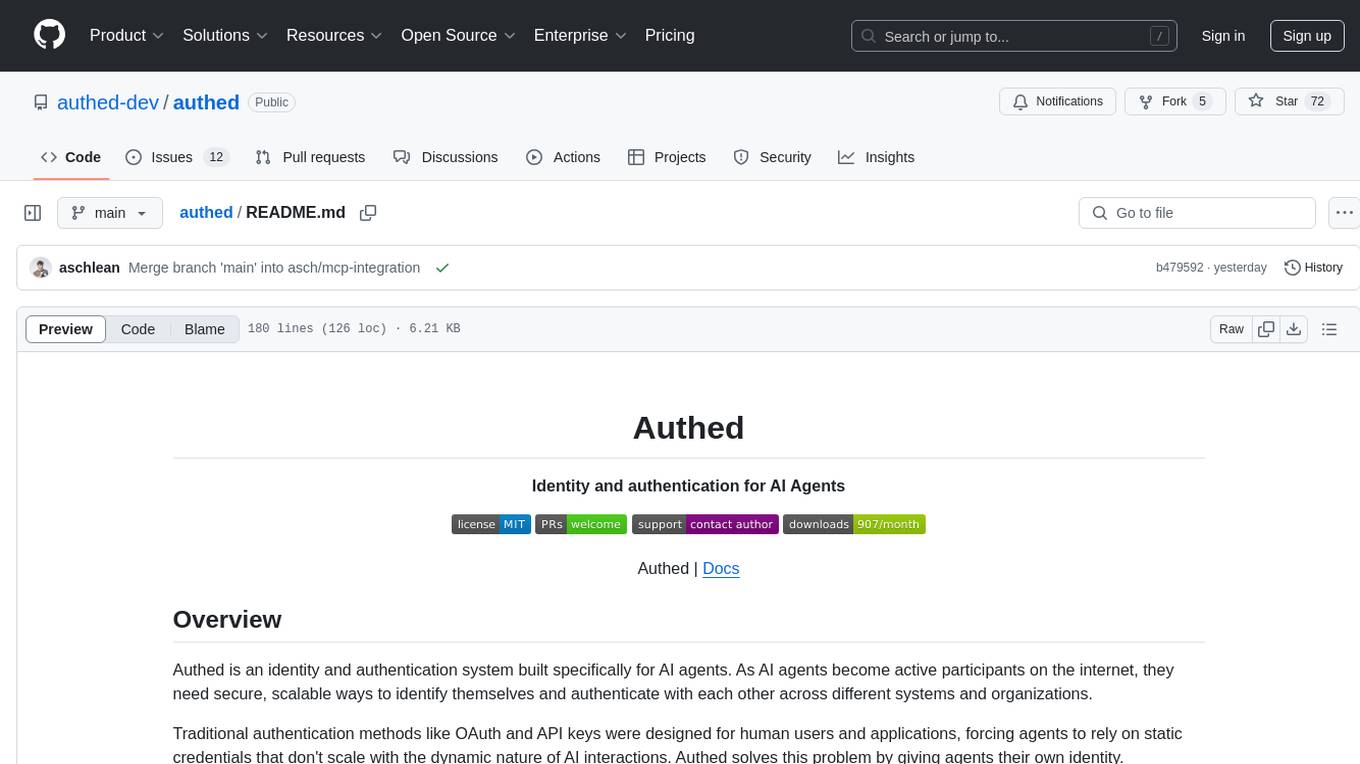
authed
Authed is an identity and authentication system designed for AI agents, providing unique identities, secure agent-to-agent authentication, and dynamic access policies. It eliminates the need for static credentials and human intervention in authentication workflows. The protocol is developer-first, open-source, and scalable, enabling AI agents to interact securely across different ecosystems and organizations.
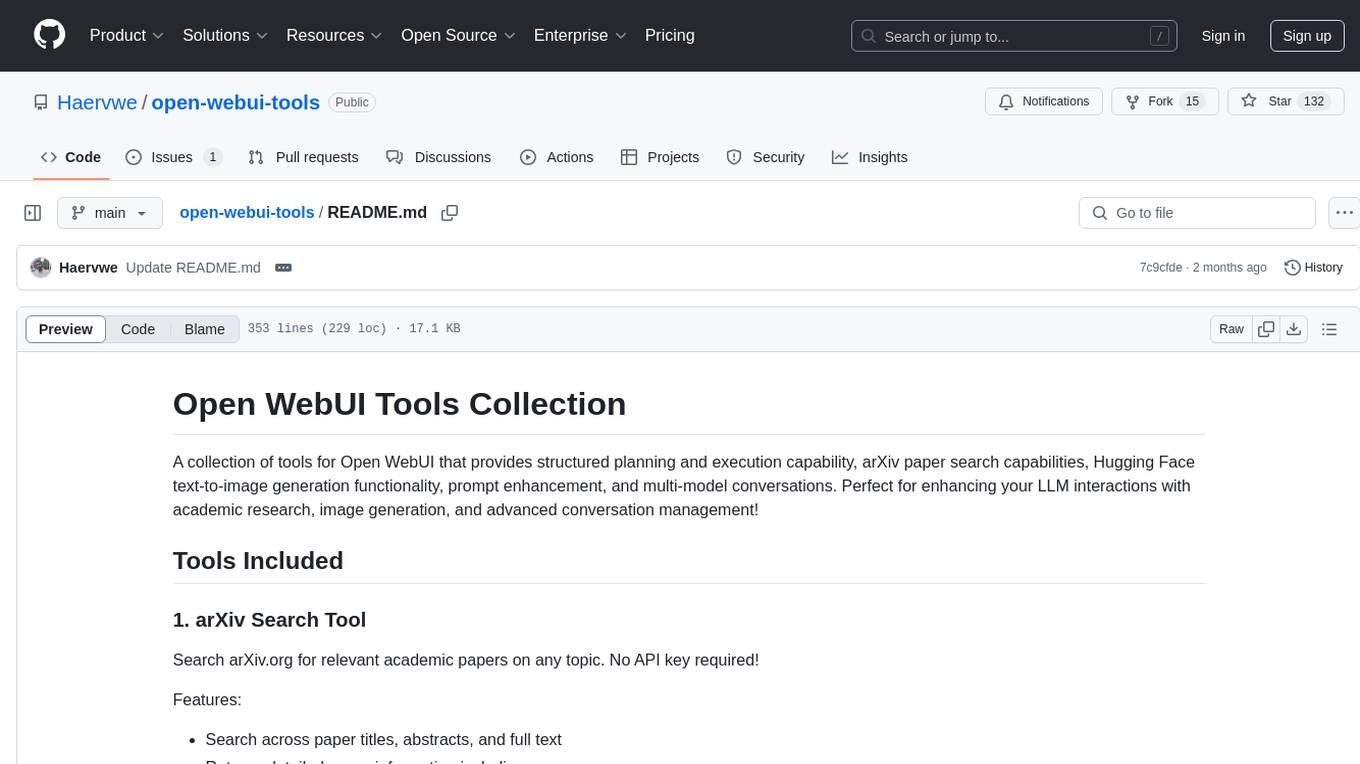
open-webui-tools
Open WebUI Tools Collection is a set of tools for structured planning, arXiv paper search, Hugging Face text-to-image generation, prompt enhancement, and multi-model conversations. It enhances LLM interactions with academic research, image generation, and conversation management. Tools include arXiv Search Tool and Hugging Face Image Generator. Function Pipes like Planner Agent offer autonomous plan generation and execution. Filters like Prompt Enhancer improve prompt quality. Installation and configuration instructions are provided for each tool and pipe.
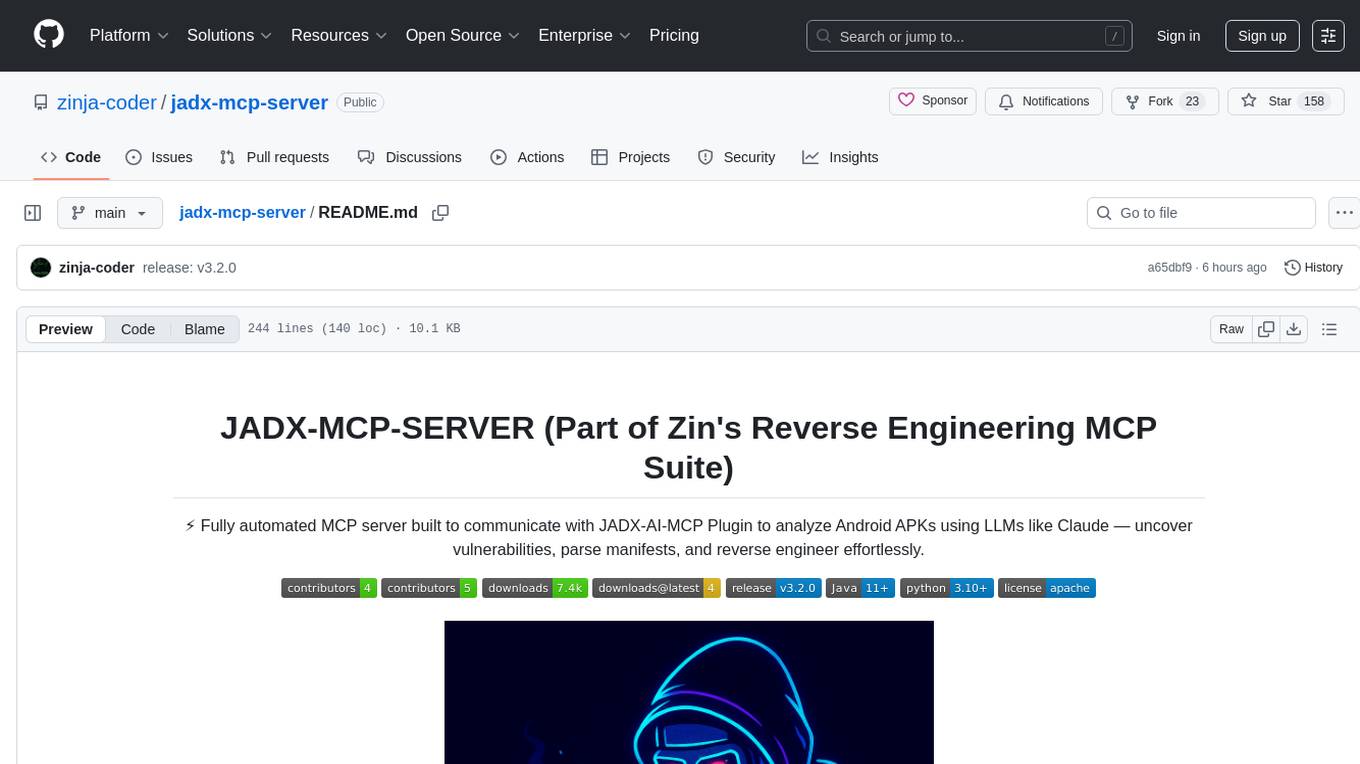
jadx-mcp-server
JADX-MCP-SERVER is a standalone Python server that interacts with JADX-AI-MCP Plugin to analyze Android APKs using LLMs like Claude. It enables live communication with decompiled Android app context, uncovering vulnerabilities, parsing manifests, and facilitating reverse engineering effortlessly. The tool combines JADX-AI-MCP and JADX MCP SERVER to provide real-time reverse engineering support with LLMs, offering features like quick analysis, vulnerability detection, AI code modification, static analysis, and reverse engineering helpers. It supports various MCP tools for fetching class information, text, methods, fields, smali code, AndroidManifest.xml content, strings.xml file, resource files, and more. Tested on Claude Desktop, it aims to support other LLMs in the future, enhancing Android reverse engineering and APK modification tools connectivity for easier reverse engineering purely from vibes.
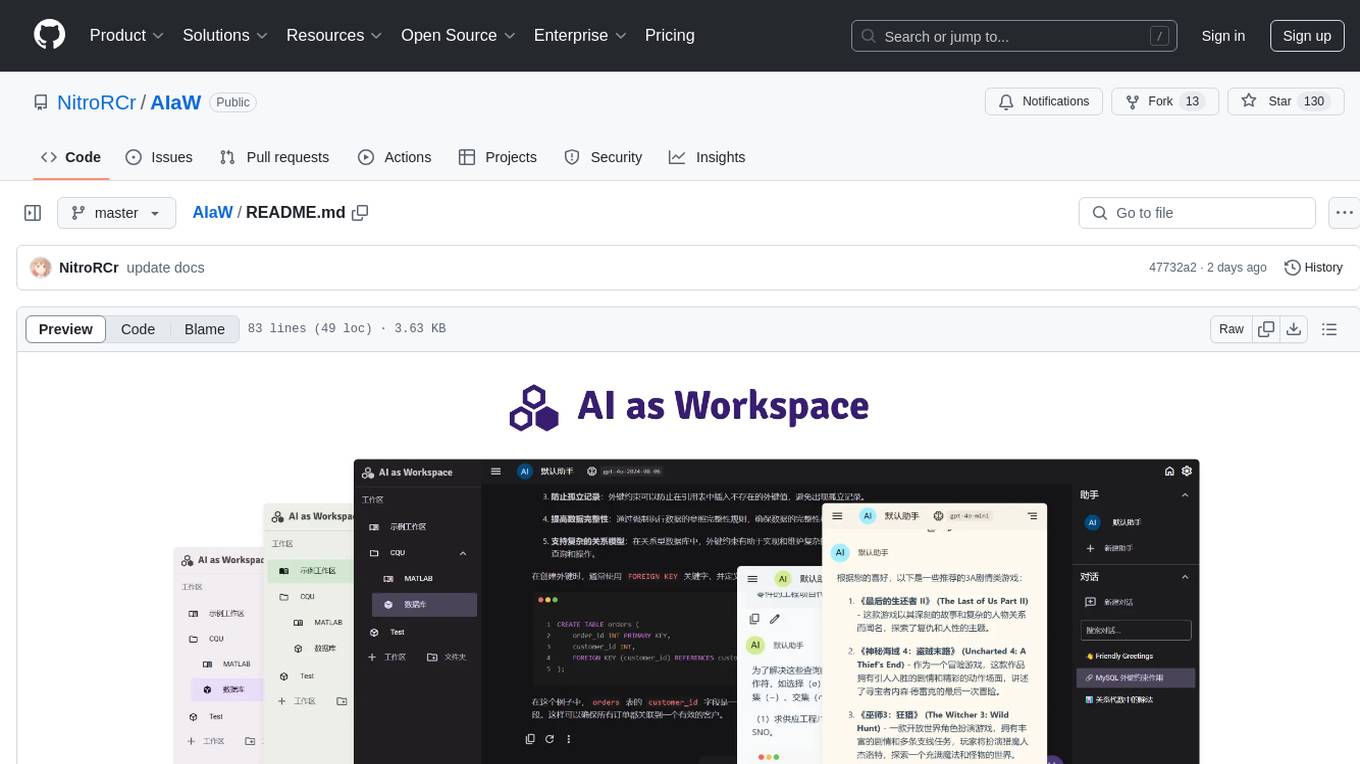
AIaW
AIaW is a next-generation LLM client with full functionality, lightweight, and extensible. It supports various basic functions such as streaming transfer, image uploading, and latex formulas. The tool is cross-platform with a responsive interface design. It supports multiple service providers like OpenAI, Anthropic, and Google. Users can modify questions, regenerate in a forked manner, and visualize conversations in a tree structure. Additionally, it offers features like file parsing, video parsing, plugin system, assistant market, local storage with real-time cloud sync, and customizable interface themes. Users can create multiple workspaces, use dynamic prompt word variables, extend plugins, and benefit from detailed design elements like real-time content preview, optimized code pasting, and support for various file types.
For similar tasks

Azure-Analytics-and-AI-Engagement
The Azure-Analytics-and-AI-Engagement repository provides packaged Industry Scenario DREAM Demos with ARM templates (Containing a demo web application, Power BI reports, Synapse resources, AML Notebooks etc.) that can be deployed in a customer’s subscription using the CAPE tool within a matter of few hours. Partners can also deploy DREAM Demos in their own subscriptions using DPoC.

sorrentum
Sorrentum is an open-source project that aims to combine open-source development, startups, and brilliant students to build machine learning, AI, and Web3 / DeFi protocols geared towards finance and economics. The project provides opportunities for internships, research assistantships, and development grants, as well as the chance to work on cutting-edge problems, learn about startups, write academic papers, and get internships and full-time positions at companies working on Sorrentum applications.

tidb
TiDB is an open-source distributed SQL database that supports Hybrid Transactional and Analytical Processing (HTAP) workloads. It is MySQL compatible and features horizontal scalability, strong consistency, and high availability.

zep-python
Zep is an open-source platform for building and deploying large language model (LLM) applications. It provides a suite of tools and services that make it easy to integrate LLMs into your applications, including chat history memory, embedding, vector search, and data enrichment. Zep is designed to be scalable, reliable, and easy to use, making it a great choice for developers who want to build LLM-powered applications quickly and easily.

telemetry-airflow
This repository codifies the Airflow cluster that is deployed at workflow.telemetry.mozilla.org (behind SSO) and commonly referred to as "WTMO" or simply "Airflow". Some links relevant to users and developers of WTMO: * The `dags` directory in this repository contains some custom DAG definitions * Many of the DAGs registered with WTMO don't live in this repository, but are instead generated from ETL task definitions in bigquery-etl * The Data SRE team maintains a WTMO Developer Guide (behind SSO)

mojo
Mojo is a new programming language that bridges the gap between research and production by combining Python syntax and ecosystem with systems programming and metaprogramming features. Mojo is still young, but it is designed to become a superset of Python over time.

pandas-ai
PandasAI is a Python library that makes it easy to ask questions to your data in natural language. It helps you to explore, clean, and analyze your data using generative AI.

databend
Databend is an open-source cloud data warehouse that serves as a cost-effective alternative to Snowflake. With its focus on fast query execution and data ingestion, it's designed for complex analysis of the world's largest datasets.
For similar jobs

weave
Weave is a toolkit for developing Generative AI applications, built by Weights & Biases. With Weave, you can log and debug language model inputs, outputs, and traces; build rigorous, apples-to-apples evaluations for language model use cases; and organize all the information generated across the LLM workflow, from experimentation to evaluations to production. Weave aims to bring rigor, best-practices, and composability to the inherently experimental process of developing Generative AI software, without introducing cognitive overhead.

LLMStack
LLMStack is a no-code platform for building generative AI agents, workflows, and chatbots. It allows users to connect their own data, internal tools, and GPT-powered models without any coding experience. LLMStack can be deployed to the cloud or on-premise and can be accessed via HTTP API or triggered from Slack or Discord.

VisionCraft
The VisionCraft API is a free API for using over 100 different AI models. From images to sound.

kaito
Kaito is an operator that automates the AI/ML inference model deployment in a Kubernetes cluster. It manages large model files using container images, avoids tuning deployment parameters to fit GPU hardware by providing preset configurations, auto-provisions GPU nodes based on model requirements, and hosts large model images in the public Microsoft Container Registry (MCR) if the license allows. Using Kaito, the workflow of onboarding large AI inference models in Kubernetes is largely simplified.

PyRIT
PyRIT is an open access automation framework designed to empower security professionals and ML engineers to red team foundation models and their applications. It automates AI Red Teaming tasks to allow operators to focus on more complicated and time-consuming tasks and can also identify security harms such as misuse (e.g., malware generation, jailbreaking), and privacy harms (e.g., identity theft). The goal is to allow researchers to have a baseline of how well their model and entire inference pipeline is doing against different harm categories and to be able to compare that baseline to future iterations of their model. This allows them to have empirical data on how well their model is doing today, and detect any degradation of performance based on future improvements.

tabby
Tabby is a self-hosted AI coding assistant, offering an open-source and on-premises alternative to GitHub Copilot. It boasts several key features: * Self-contained, with no need for a DBMS or cloud service. * OpenAPI interface, easy to integrate with existing infrastructure (e.g Cloud IDE). * Supports consumer-grade GPUs.

spear
SPEAR (Simulator for Photorealistic Embodied AI Research) is a powerful tool for training embodied agents. It features 300 unique virtual indoor environments with 2,566 unique rooms and 17,234 unique objects that can be manipulated individually. Each environment is designed by a professional artist and features detailed geometry, photorealistic materials, and a unique floor plan and object layout. SPEAR is implemented as Unreal Engine assets and provides an OpenAI Gym interface for interacting with the environments via Python.

Magick
Magick is a groundbreaking visual AIDE (Artificial Intelligence Development Environment) for no-code data pipelines and multimodal agents. Magick can connect to other services and comes with nodes and templates well-suited for intelligent agents, chatbots, complex reasoning systems and realistic characters.







